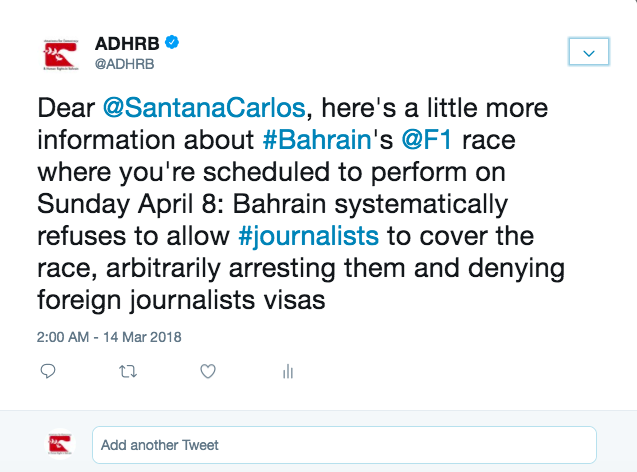On 7 March 2018, Americans for Democracy & Human Rights in Bahrain (ADHRB) sent the following letter to Carlos Santana. On 12 March 2018, ADHRB also directed tweets to Mr. Santana on his Twitter account. At the time of writing, ADHRB has received no response from Mr. Santana.
Read a pdf of the letter here.
Dear Mr. Santana:
Americans for Democracy & Human Right in Bahrain (ADHRB) writes to you in your capacity as an entertainer performing at the upcoming Formula One Grand Prix to bring your attention to the ongoing human rights abuses in Bahrain. We particularly wish to highlight the increase in arbitrary arrests and suppression of freedom of expression that occurs each year in the weeks leading up to the Grand Prix event. ADHRB asks that you use your unique position as a public figure with a dedicated fan base to use your platform to inform your fans on the human rights situation in Bahrain.
In February 2011, Bahraini protestors took to the streets to peacefully call for political reform. In response, the Bahraini government began a concerted effort to arrest and detain activists, human rights defenders, journalists, and political figures. Seven years later, the government of Bahrain has continued its repression of civil society, including prominent human rights defender Nabeel Rajab, who was convicted to two years in prison for speaking with foreign press, and faces up to 15 years in prison for tweets critical of the government. In the last year and a half, the government has also dissolved all major opposition political parties and suspended the only independent newspaper in the kingdom. In addition to these violations of freedom of expression, the government of Bahrain has also recently amended the Constitution to allow for the military trial of civilians, the first case of which resulted in six death sentences and revocation of citizenship for 13 individuals. As recently as January and February of this year, Bahrain has continued to impose heavy sentences and strip citizens of their nationalities in mass trials; in a two-day period Bahrain convicted 84 individuals, denaturalizing 72 of them.
In addition to these ongoing rights abuses, the presence of Formula One in Bahrain has coincided with renewed crackdowns and police brutality, sometimes fatal. In 2012 Salah Abbas, a 36-year-old father of five, was beaten and shot to death during a protest in the village of Shakhura the night before the race. Also in 2012, police shot and killed 22-year-old Ahmed Ismail, a photojournalist who was covering protests surrounding the Formula One Grand Prix. In advance of the 2015 race, law enforcement used excessive force in response to peaceful protests against Formula One activities in Bahrain, including the use of tear gas and shotguns against protestors in 48 instances. Security forces also conducted warrantless arrests of 22 individuals, and arrested others in violation of the freedoms of assembly and expression. These violations occurred again in 2016 in the two weeks prior to the Grand Prix in Bahrain, including 57 arbitrary arrests and the indiscriminate use of tear gas against protestors. Additionally, a 17-year-old boy was struck by a police vehicle and killed during the April 2016 race. The Grand Prix in April 2017 saw similar human rights abuses, including the use of tear gas against protestors and the targeting of free speech. Violations last year included the detention and interrogation of a journalist, and the denial of press accreditation and licenses for international media outlets.
The Bahraini government also acts to suppress free press, particularly surrounding the Formula One events and related protests. During the 2012 Bahrain Grand Prix, journalists with Channel 4 News, The Telegraph, Asahi Shimbun, and others, were arrested and detained for reporting in Bahrain. Numerous journalists were also denied visas to cover the Bahrain Grand Prix, as Bahraini officials stated they were only granting visas to journalists who normally cover the Formula One race. Since then, Bahraini officials require journalists who have been granted visas to sign a form stating they strictly cover the race and nothing else in Bahrain. The Bahraini government has even begun denying accreditation for Bahraini journalists reporting for foreign media outlets. Conditions are fragile for journalists in Bahrain. In the 2017 Reporters Without Borders Freedom Index, Bahrain ranked 164 out of 180 nations, falling two places from the previous year.
We understand the importance of the Formula One race to the racing community, and the significance that comes with performing at such an important event. However, we encourage you to be vocal about human rights abuses that take place in the context of the Grand Prix. ADHRB asks that you communicate these abuses to Formula One and express your interest in ensuring that they fully implement their human rights and due diligence policies and prevent further human rights abuses from occurring. We also call on you to communicate your concerns regarding the context of human rights violations in Bahrain, and particularly the pattern of increased abuses that occurs each year in connection with the Grand Prix. We ask that you engage with your fans on social media outlets such as Twitter, Instagram, and Facebook, and voice your concerns in interviews at the Grand Prix. As an individual involved in human rights work yourself (in your role as the founder of the Milagro Foundation), we hope that you will use your platform as an artist, author, musician, promoter of peace, and humanitarian to speak publicly on these issues, and to support the Bahraini people.
Sincerely,
Husain Abdulla
Executive Director
Americans for Democracy & Human Rights in Bahrain





